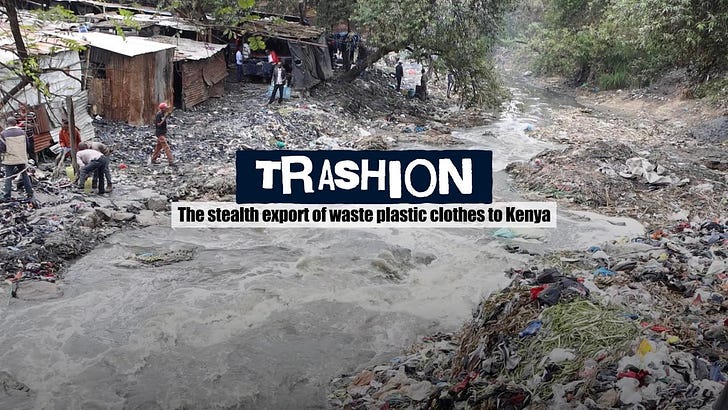I wrote a whole different issue for this weekend, but then I watched Trashion: The stealth export of waste plastic clothes to Kenya, and if you do nothing else this weekend, at least set aside 15 minutes to do the same. Changing Markets Foundation exposes what is really happening when we “throw our clothes away.” Western clothes are polluting the Global South and the problem is only getting worse. Without much use for cheap material clothing that arrives already in poor condition, the garments are clogging rivers, then breaking down into microplastics as they enter the sea or being burned as cooking fuel releasing the toxic chemicals so often found in apparel mostly comprised of synthetics. These are the consequences of over-production and over-consumption without any infrastructure to handle the amount of waste created. We have all contributed to this. In a recent BoF article, Sarah Kent questions if brands should be responsible for their “Waste Colonialism.” Yes, brands should be responsible, but as a consumer, we shouldn’t wishcycle with our clothes by thinking that by “giving them away” or “throwing them out” they go on to live a happy second life, Trashion shows the devastating reality of fashion’s end of life.
How to help instead of contributing to this issue:
Buy less
Participate in clothing swaps to pass on garments you are no longer wearing
If you are buying something new, select items made from quality materials that will last longer
Support the work of the Or Foundation to hold brands responsible
This Week in Fashion and Sustainability:
For New York friends- Casa Privada Vintage is popping up at the worth-waiting-in-line for bakery, L’Appartement 4F this weekend. Croissants + secondhand *chef’s kiss*
For LA friends- @ClimateDiva is hosting a free clothing swap on February 25th in Venice
Ryan Roche wants your preloved cashmere sweaters- Send them your 100% cashmere sweater, you will get a $100 site credit and they will recycle them into rejuvenated cashmere yarns, which in theory reduces the high demand for new raw cashmere and decreases the carbon footprint of production.
I think this is a good initiative if used consciously. Giving you site credit to buy something new encourages more consumption, however, if you already had a sweater you were planning on “throwing out”, this circular concept is a better alternative to the sweater ending up in a landfill (see video above).
Save this circular NYC map - a vast resource of circular economy-related companies, initiatives, and organizations in New York. Here you can find refill stores, repair shops, community gardens collecting compost, and where to recycle electronics.
Beat up bags are in-trend- a good reason to keep using what you already own
Peder Cho launched his debut collection, UTOPIA by Peder Cho, during NYFW last week featuring upcycled designs and deadstock fabric pieces.
Chloé unveils their digital ID which will be in all bags by 2025. The technology allows you to trace all aspects of the supply chain and will make repairs and resale more seamless in the future.
Weekend Reading: This Op-Ed by Beth Esponnette on “When Sustainable Fashion Does More Harm Than Good.”
Things That Bring Me Joy & Small Wins for Sustainability:
My StoJo cup- I’m currently traveling around California for the month and being away from home tends to create more waste,
Borrowing from peers on Tulerie - I recently rented this dress for a wedding (see below.) With Tulerie, you can also earn credit when you lend out your closet as well. Mention Hilliary and Something Borrowed, Never New during your interview for $50 off your first borrow.
Something borrowed, never new is written by Hilliary and edited by Juliana Radich.
Hilliary is a climate advocate who is passionate about sustainability practices within the fashion industry. She has ten years of experience working in fashion marketing and recently graduated from Columbia University with a Master’s in Sustainability.
Thanks for reading Something Borrowed, Never New! Subscribe for second-hand scores, industry news, sustainability suggestions, and other musings




